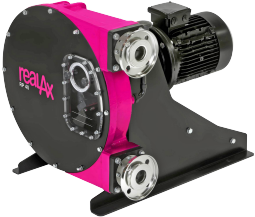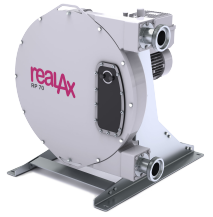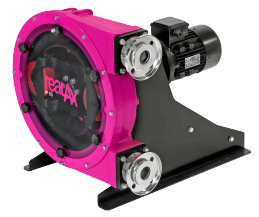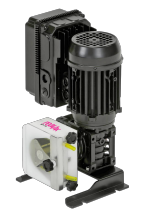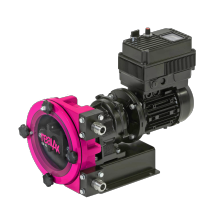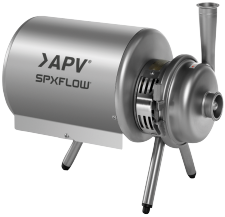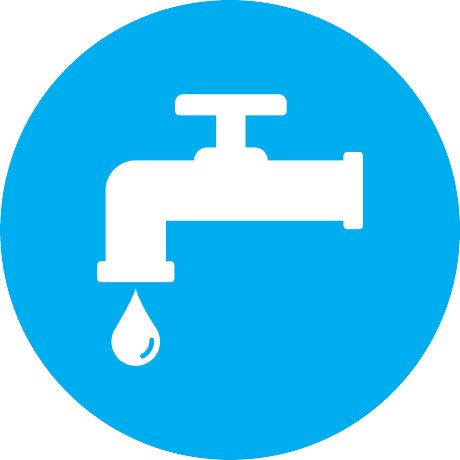What are sanitary pumps?
Sanitary pumps are designed specifically for use in applications where hygiene and cleanliness are critical, such as in the food, beverage, pharmaceutical, and biotech industries. Some common types of sanitary pumps include:
- Centrifugal pumps: These pumps are widely used in the food and beverage industry because they are easy to clean, maintain and sanitize. They can handle low to high viscosity fluids and are available in a variety of materials such as stainless steel, plastic, and others.
- Positive displacement pumps: These pumps are ideal for transferring viscous materials and are commonly used in the pharmaceutical and cosmetic industries. They can be further classified into rotary lobe, gear, AODD and peristaltic pumps.
All of these pumps are designed to meet stringent hygiene and cleanliness standards and are made of materials that are easy to clean and sanitize. They are also designed to prevent contamination and ensure that the product being pumped remains free of any impurities.
Classifications of sanitary pumps
Sanitary pumps can be classified into different levels based on their intended use and the level of hygiene required. The two primary levels of sanitary pumps are aseptic and hygienic pumps:
 Aseptic pumps
Aseptic pumps
Aseptic pumps are designed for use in the most demanding applications where the highest level of cleanliness and sterility is required. These pumps are typically used in the food and pharmaceutical industries for processing products such as dairy, beverages, and injectable drugs. Aseptic pumps are designed with special features, such as hermetically sealed systems, sterile barrier technology, and clean-in-place (CIP) and sterilize-in-place (SIP) capabilities, to ensure that the product is protected from contamination throughout the processing cycle.
Read more about aseptic pumps
 Hygienic pumps
Hygienic pumps
Hygienic pumps are designed for use in applications where a high level of hygiene is required, but not necessarily aseptic conditions. These pumps are typically used in the food, beverage, and pharmaceutical industries for processing products such as sauces, soups, cosmetics, and personal care products. Hygienic pumps are designed with features such as polished surfaces, easy-to-clean designs, and FDA-approved materials to prevent contamination and meet regulatory requirements.
Overall, aseptic pumps are the highest level of sanitary pumps, designed for the most demanding applications, while hygienic pumps are suitable for a wide range of applications where a high level of hygiene is required. Read more about hygienic pumps
 Advantages of sanitary pump
Advantages of sanitary pump
Drum pumps are widely used in industrial applications for the transfer of various types of fluids, ranging from low viscosity liquids to highly viscous materials, such as oils, chemicals, and food products. There are several advantages associated with the use of drum pumps which include:
 Cleanability: Sanitary pumps are designed with smooth surfaces, polished finishes, and crevice-free connections to prevent the buildup of bacteria, contaminants, and other unwanted materials, making them easier to clean and sanitize.
Cleanability: Sanitary pumps are designed with smooth surfaces, polished finishes, and crevice-free connections to prevent the buildup of bacteria, contaminants, and other unwanted materials, making them easier to clean and sanitize. - Hygiene: Sanitary pumps are made of materials that are safe for use in food and pharmaceutical processing, reducing the risk of contamination or product adulteration.
- Versatility: Sanitary pumps are available in a variety of designs, including centrifugal, positive displacement, and air-operated, to meet different processing needs.
 Regulatory compliance: Sanitary pumps are designed to meet strict regulatory requirements and industry standards, such as 3-A Sanitary Standards, FDA, and cGMP, ensuring that products are safe for consumption and meet quality specifications.
Regulatory compliance: Sanitary pumps are designed to meet strict regulatory requirements and industry standards, such as 3-A Sanitary Standards, FDA, and cGMP, ensuring that products are safe for consumption and meet quality specifications.
Industries and applications that use sanitary pumps
 Sanitary pumps play a critical role in industries and applications that demand high levels of hygiene and cleanliness to ensure product quality and safety. These pumps are used in a range of industries, including food and beverage processing, pharmaceutical manufacturing, personal care and cosmetics, biotech and biomedical research, and chemical processing.
Sanitary pumps play a critical role in industries and applications that demand high levels of hygiene and cleanliness to ensure product quality and safety. These pumps are used in a range of industries, including food and beverage processing, pharmaceutical manufacturing, personal care and cosmetics, biotech and biomedical research, and chemical processing.
 In food and beverage processing, sanitary pumps are essential for processing products such as dairy, juices, sauces, syrups, and carbonated drinks. The pumps are designed to meet strict regulatory requirements and industry standards such as the 3-A Sanitary Standards and FDA regulations to guarantee that products are safe for consumption and meet quality specifications.
In food and beverage processing, sanitary pumps are essential for processing products such as dairy, juices, sauces, syrups, and carbonated drinks. The pumps are designed to meet strict regulatory requirements and industry standards such as the 3-A Sanitary Standards and FDA regulations to guarantee that products are safe for consumption and meet quality specifications.
In the pharmaceutical industry, aseptic pumps are particularly important for processing products such as injectable drugs, vaccines, and parenteral nutrition solutions. These pumps are designed to maintain the sterility of the products throughout the manufacturing process, ensuring that they are safe for use.
 Sanitary pumps are also used in personal care and cosmetics applications such as lotions, creams, shampoos, and soaps. They are designed to meet strict hygiene standards and prevent contamination of the products, guaranteeing that they are safe for use on the skin.
Sanitary pumps are also used in personal care and cosmetics applications such as lotions, creams, shampoos, and soaps. They are designed to meet strict hygiene standards and prevent contamination of the products, guaranteeing that they are safe for use on the skin.
In biotech and biomedical research, sanitary pumps are used for processing biological samples, cell cultures, and other research materials. These pumps are designed to meet strict hygiene standards and prevent contamination of the samples, ensuring the integrity of research results.
 Finally, in chemical processing applications, sanitary pumps are used to handle corrosive, abrasive, and viscous fluids. The pumps are designed to meet strict safety standards and prevent leakage and contamination of the fluids, ensuring safe handling of chemicals.
Finally, in chemical processing applications, sanitary pumps are used to handle corrosive, abrasive, and viscous fluids. The pumps are designed to meet strict safety standards and prevent leakage and contamination of the fluids, ensuring safe handling of chemicals.
Important considerations when selecting sanitary pumps
When selecting sanitary pumps for a particular application, there are several important considerations that need to be taken into account. These considerations include:
- Material of construction: The material of construction for the pump must be carefully selected based on the type of product being pumped and the cleaning and sterilization methods used. For example, stainless steel is a common material used for sanitary pumps because it is durable, corrosion-resistant, and can withstand high temperatures and chemical exposure.
- Pump design: The pump design must be selected based on the specific application requirements, such as flow rate, pressure, viscosity, and temperature. The pump design must also take into account the ease of cleaning and maintenance, as well as the compatibility with the cleaning and sterilization methods used.
- Hygienic design: The pump must be designed with hygienic principles in mind to prevent the buildup of bacteria and contamination of the product. The pump must have smooth surfaces, crevice-free joints, and be easy to disassemble and clean.
- Regulatory compliance: The pump must meet regulatory standards and industry-specific requirements, such as 3-A Sanitary Standards, FDA, and cGMP. Compliance with these standards ensures that the pump is suitable for use in the specific application and meets the necessary safety and quality standards.
- CIP/SIP capabilities: The pump should have CIP (clean-in-place) and SIP (sterilize-in-place) capabilities to ensure that the pump and associated piping and equipment can be cleaned and sterilized in place without disassembly. This reduces the risk of contamination and makes the cleaning and maintenance process more efficient.
Why buy sanitary pumps from AxFlow?
AxFlow provides sanitary pumps that cater to an extensive variety of industries and applications. Exclusive to AxFlow, you will be provided with personalized recommendations from highly experienced process engineers, and access to the most prominent process technology manufacturers that are independent of the manufacturer. If you require assistance in selecting the appropriate pumps that satisfy your requirements, feel free to contact AxFlow without any delay. AxFlows engineers and specialists can help with the selection process, specifications, installation, and maintenance of your fluid handling equipment.



